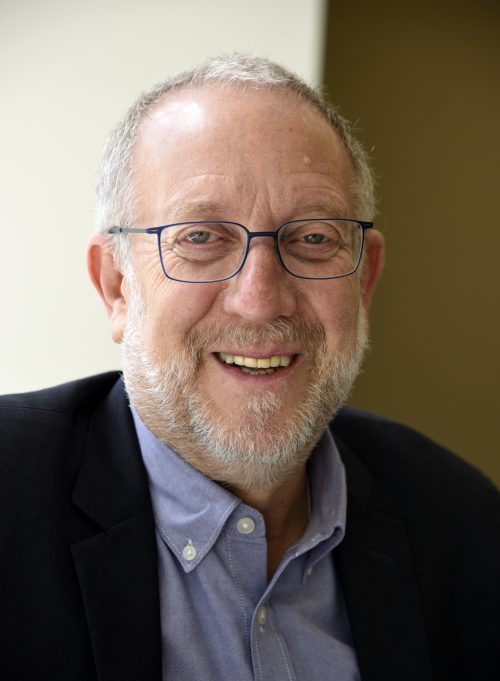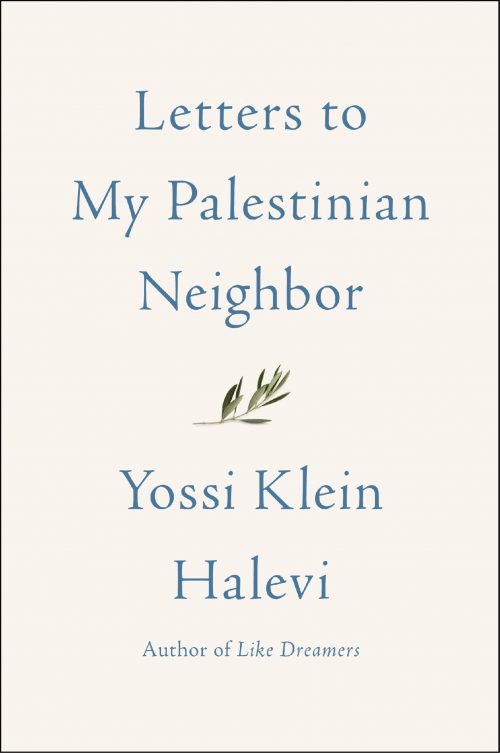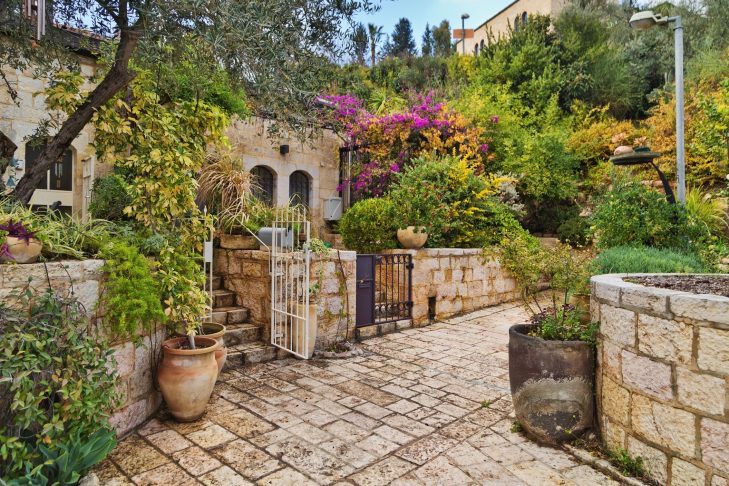Yossi Klein Halevi’s front porch in Jerusalem’s French Hill neighborhood affords him a complicated and even metaphorical view of the Middle East. With the Dead Sea and the Judean desert in the background, Halevi can also see the lights in the kingdom of Jordan twinkling against the black sky. More significantly, Halevi has a close-up view of Israel’s security barrier—a physical wall on which one side is Halevi’s Jerusalem and the other is the edge of several Palestinian villages. For Halevi this provides an intimate view of the Israeli-Palestinian conflict—a conflict he explores in his eloquent and important new book, “Letters to My Palestinian Neighbor.”
In a wide-ranging conversation with JewishBoston, Halevi explained that the security barrier is the first and last thing he sees every day from his apartment. “With the suicide bombings, the growing estrangement and the hate between the two societies, I learned not to see the wall,” he said. “My eye went over the wall to see the desert hills and everything beyond it. This book was in part an exercise in learning how to see again. I learned to see the totality of my landscape.”

Halevi is a brilliant observer of his surrounding environs. “Letters to My Palestinian Neighbor” is a sequel of sorts to a book he published in 2001 called, “At the Entrance to the Garden of Eden: A Jew’s Search for Hope with Christians and Muslims in the Holy Land.” In that book, Halevi launched a yearlong journey to find wisdom and strength among fellow spiritual seekers. It’s a book that showed the generous access he had to the three monotheistic faiths playing crucial roles in Israel. It’s also a book that Halevi said he could not write today. Many of the places he visited are not only currently off-limits, but also perilous for Israeli Jews. “I took that trip into Israeli society in the waning years of the Oslo process,” he said. “It was the late ‘90s and I spent a year traveling through the West Bank and Gaza trying to understand the Palestinian narrative.”
In “Letters,” Halevi turns the tables to explain the Jewish narrative to his neighbors—neighbors who actually represent Palestinian society and are particular in Halevi’s imagination. He said he had two audiences in mind as he wrote the book. The first and primary audience was Palestinians and others in the Arab world. “My purpose here,” said Halevi, “is to try to create the first public conversation among Israelis, Palestinians and Muslims about Israel’s story, our history, our indigenousness to the land and our shared future. To that end, the book has been translated into Arabic and the first letter is already available online. My commitment is to respond to every letter I get that is written in a reasonable way, no matter the point of view or how hard the criticism may be.”
Halevi said “Letters” also has the distinction of being published simultaneously in Arabic and English—the book will also be available in Arabic before it comes out in Hebrew. “That should be an indication,” he noted, “of my seriousness in searching for people who are willing to speak to an Israeli about very complicated issues of narrative. It’s the missing piece in all of these years of negotiations.”

Halevi’s other audience is young American Jews. Halevi initially thought he would have to write two books—one to his Palestinian neighbors and another to American Jewry. But he realized that much of what Palestinians don’t understand about Jewish history, identity and the relationship among peoplehood, religion, land and sovereignty are many of the same issues that young American Jews don’t grasp.
Halevi consistently interfaces with Muslims as the co-director of the Shalom Hartman Institute’s Muslim Leadership Initiative. The initiative was founded in 2013 by Imam Abdullah Antepli, who heads Muslim affairs at Duke University and is the school’s first Muslim chaplain. Antepli realized that Muslims did not understand how Jews understood themselves. He approached Halevi to set up a program to teach emerging Muslim leaders about Judaism, Jewish identity and Zionism. In the six years since the program began, Halevi and Antepli have created a curriculum, which Halevi asserted, “explains the relationship between peoplehood and the land. It may be the only curriculum in the world that teaches Judaism and Jewish identity to successive groups of Muslims.”
For his part, Halevi said he approaches the Israeli-Palestinian conflict as a centrist, seeing the points of both the Israeli left and the right. In the First Intifada, he said that as an Israel Defense Forces soldier in Gaza he saw directly “what an occupation feels like inside of me. It was one of the most important experiences of my life and it helped me break through an unwillingness to face reality. That was true not only for me but for Israeli society, which elected [Yitzhak] Rabin in 1992 as part of a response to that intifada. The left won the argument about the dead-end nature of controlling another people.”
As for the Second Intifada, which began in 2000, Israelis experienced four years of suicide bombings—bombings that convinced a majority of Israelis that the right had been correct about making peace with a Palestinian national movement that deployed terrorism. “It was the fact that the suicide bombings came after Israeli efforts to end the occupation and create a Palestinian state,” Halevi said. “You can’t understand Israel today without putting the two intifadas together.”
Halevi noted that Israel is no longer divided between the left and right as it was in the ‘80s and ‘90s. The result is that today Israel has a very large center. “My book is written from that centrist perspective,” he said. “A centrist is somebody who has internalized the left-right divide. I agree with the left about the occupation and I agree with the right about the need for extreme caution in entering into a delusional one-way peace process as we did in the ‘90s. We’re stuck in a place where left and right have stalemated each other. I wrote this book to unfreeze myself and begin reengaging with my Palestinian neighbors.”
Yossi Klein Halevi will be speaking about “Letters to My Palestinian Neighbor” at Temple Emanuel in Newton on Sunday, June 3. Find more information here.



